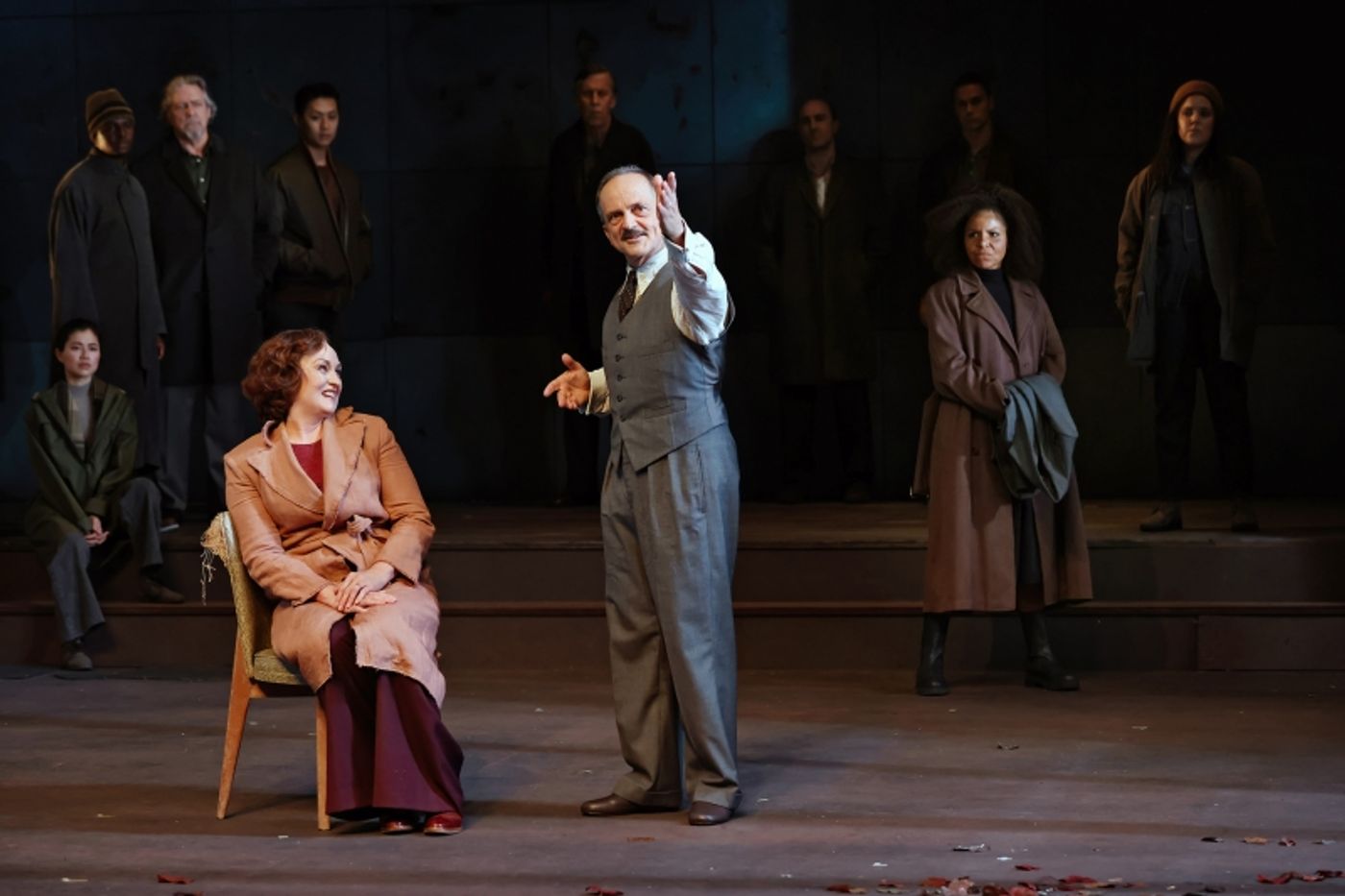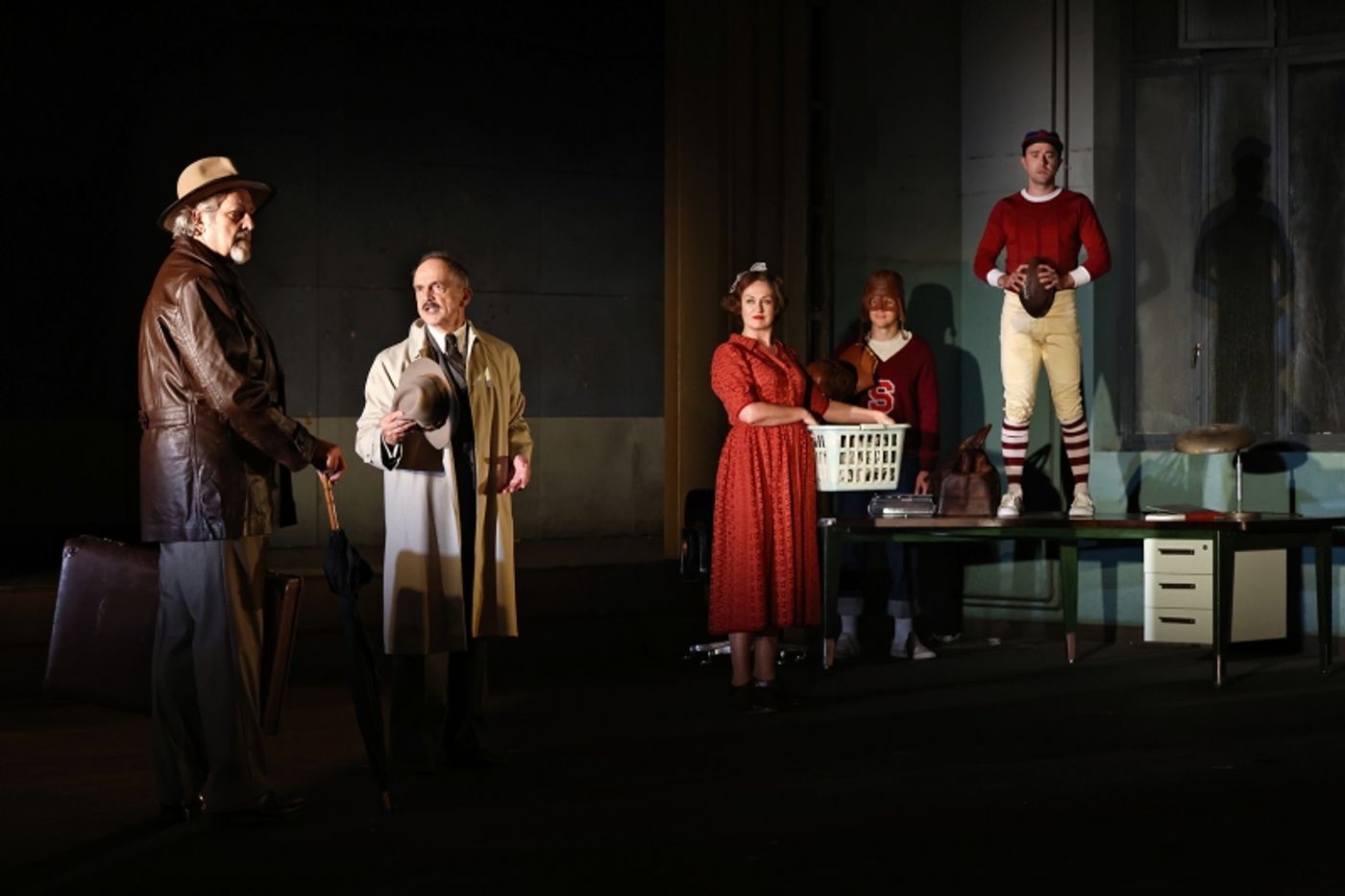Review: A Bleak Look At The Combination Of Capitalism And Constructed Delusions, DEATH OF A SALESMAN Retains A Relevant Reminder To Retain A Grip On Reality
DEATH OF A SALESMAN

Wednesday 8th December 2021, 7:30pm, Roslyn Packer Theatre
Reinforcing the eternal themes within Arthur Miller's Pulizter Prize Winning DEATH OF A SALESMAN, Paige Rattray (Director) presents the with stark clarity. Written in 1949, this timecapsule of 1940's New York retains a relevance in its expression of families, relationships and the ambition that parents hold for the next generation.

The premise of Miller's work is that the 63-year-old Willy Loman (Jacek Koman) has been a travelling salesman, working for the same company, for the past 40+ years but now the decades of driving up and down the east coast of America is starting to take its toll in the form of flashbacks that disconnect him from the present, leading to car accidents and exhaustion. His devoted wife Linda (Helen Thomson) encourages him to ask for a reassignment to a New York portfolio so he won't have to drive and he's confident that his boss, the young ambitious Howard (Alan Zhu), who he as seen takeover the company from Howard's father, the late Frank, will reward Willy for his service and loyalty, deluded into believing that Frank's promise will be upheld by the son. The other problem with the flashbacks is that they are forcing Willy to consider his life's purpose and the success, or lack thereof, of his sons Biff (Josh McConville) and Happy (Callan Colley). While younger son Happy lived his life in his brother's shadow, Biff was always expected to be a success following on from his achievements on the high school football team but his failing to finish his high school diploma halted his college prospects and led him to a life that didn't fit with Willy's wishes. Set over two days, DEATH OF A SALESMAN considers what happens when each of the various family members start to see beyond the salesman's spin.

While the original script indicates that Miller originally saw the play set predominantly in a more realistic representation of the Loman's family home in New York, Rattray's reimagining for the 21st century presents the story as a myth or legend being told by a narrator (Brigid Zengeni) with recreations of the story manifesting themselves in a dilapidated institutional space reminiscent of a school hall or factory space that once housed large machinery. Set designer David Fleischer utilizes the space of the Roslyn Packer Theatre stage to create a cavernous space with steps up to a raised level with architrave panels missing, high windows and a few odd remnants of occupation in the form of chairs, a folding table and refrigerator. The enormous light fitting speaks to a bygone era of opulent New York supper clubs while peeling paint reminds the audience that this is a long disused space. As the story of the Salesman, Willy and his family unfolds, Zengeni sets the scene with her narrations while the additional performers, dressed (Teresa Negroponte, Costume Design) to appear as general unobtrusive observers dressed for a winter in New York, watch from the sidelines and provide additional sound effects and prop changes.

The work retains a relevance in reminding audiences that while it is good to have hope and dreams and want the best for our children, it is important to still have a good grasp on reality. Jacek Koman is powerful as the father, a New Yorker with a European undertone in his accent, ensuring that he is seen as a blend of ambitious while being ignorant to how deluded he is as he has come to believe the sales pitch he's been selling his family about how good he is and how good they are. There is an endearing nature that makes the audience want to pity him, but this gradually gets overridden by the realization that he has been refusing to face reality for years while being obnoxiously stubborn to the prospect of listening to anyone else. As wife Linda, Helen Thomson captures the spirit of a housewife who has known for a long time that her husband won't change and that she's better off just trying to keep the peace. There is the expected submissive nature associated with the era which can feel cloying in the face of 21st century sensibilities.

Josh McConville's expression of eldest son Biff captures the self-doubt and drifting confidence that wants to make his father happy but also realizing that his joy cannot be achieved by following his father's career path. McConville ensures that the weight of Willy's expectations is clear and his transition from teenager with a bright future of college offers in front of him to adult discovering that he prefers the idea of creating something as a farmer is powerful. As younger brother Happy, Callan Colley reinforces that all of Willy's focus was aimed at Biff and Happy constantly sought out his father's approval with little to no recognition, a position that remained as the boys became men, potentially influencing Happy's playboy antics and continuation of lies and delusions.

Outside of the core family is Willy's late brother, the more successful Ben (Philip Quast) who Willy 'talks' to for guidance, neighbour and Willy's longtime friend and quasi benchmark of success Charley (Bruce Spence) and Charley's nerdy son Bernard (Thuso Lekwape). Quast has a rich gravitas ensuring that it is clear why Willy looks up to his brother and in some ways regrets not going with Ben in favour of staying in New York, starting a family, and spending his life working to pay the various loans he has taken out to purchase a car, house and refrigerator. Spence adds some brilliant physical comedy, particularly in the minor appearance as a waiter at the club Biff and Happy plan to meet their father.

The second act of the work is powerful and captivating, benefiting from the inclusion of some more substantial set pieces. The first act, heavily reliant on dialogue and monologue with little to no set dressing adds a further challenge to understanding the heavy accents. The inclusion of songs, presented by the cast is an unexpected treat particularly the duet between Quast and Zengeni as supper club singers. While remaining an incredibly bleak and honest expression of American life, a contributing factor to its Pulitzer Prize win, DEATH OF A SALESMAN retains a relevance in terms of considering the continued commercialism of society along with the aspiration for the "American Dream" that people still strive for.
https://www.sydneytheatre.com.au/whats-on/productions/2021/death-of-a-salesman
Videos

